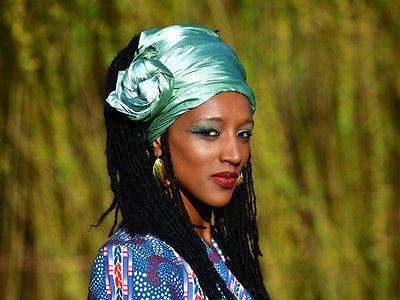Name: Monica Tavares aka Mo'Kalamity
Nationality: French
Occupation: Singer, songwriter
Current Release: Mo'Kalamity's Shine is out via Sofia Thea. Get the vinyl here.
If you enjoyed this Mo'Kalamity interview and would like to stay up to date with her music and releases, visit her official homepage. She is also on Instagram, and Facebook.
Do you think that some of your earliest musical experiences planted a seed for your interest in your voice and singing? How and when did you start singing?
Yes, of course, my earliest experiences shaped the singer I am today.
I started singing when I was a child in a church choir. I remember perfectly the feeling of joy that animated me while singing; it was a true revelation without imagining that I would become a singer.
I realized much later, in adolescence, that my voice conveyed something through the response and reactions of my peers.
If you're also playing other instruments, how does the expressive potential of these compare to your own voice?
I am self-taught, I learned to play the guitar later on. I continue to learn, and it represents a real freedom to unleash my imagination and inspiration.
I accompany myself in singing and create the foundation of my music.
Singing is an integral part of all cultures and traditions. Which of these do you draw from – and why?
I love traditional music from wherever it comes because it is the basis of our daily lives. It is the purest expression of our beings.
I draw inspiration from African music, blues, gospel, R&B, jazz, and I especially love Mandingue music.
What were some of the main challenges in your development as a singer/vocalist? Which practices, exercises, or experiences were most helpful in reaching your goals – were there also “harmful” ones?
The challenges as a singer are to preserve and work on your voice, which implies having good physical condition, staying healthy to offer the best vocal performances on stage.
I have always practiced sports and continue today to maintain good respiratory capacity and burn toxins and unnecessary tensions.
How do you see the relationship between harmony, rhythm, and melody? Do you feel that honing your sense of rhythm and groove has an effect on your singing skills?
In my creative process, melody and rhythm intertwine, then come the lyrics.
Harmony complements or accentuates certain parts of the song.
What are the things you hear in a voice when listening to a vocalist? What moves you in the voices of other singers?
I hear a whole, I hear their soul, a part of their personality.
What moves me is the texture of the voice, the sensitivity, the sincerity in the music, the groove ...
How would you describe the physical sensation of singing?
It's your whole being vibrating, it comes from the belly ... sometimes to translate the music I feel or if I have to visualize it, I see geometric shapes ...
I release my emotions through singing and the themes I address in my songs. Music is also a remedy that allows me to rebalance, share the emotions of life ... Music soothes the soul.
What kind of musical settings and situations do you think are ideal for your own voice?
Concerts, the interaction on stage with my musicians, live performances are ideal for my voice.
Each concert is different. They allow me to explore and express myself fully.
We have a speaking voice and a singing voice. Do these feel like they are natural extensions of each other, ends on a spectrum, or different in kind?
The body is a resonating chamber. Through the vibrations of singing, I feel the extension and a revelation of another part of my self.
From whispers to screams, from different colors to dynamics, what are the potentials and limits of your voice? How much of your vocal performance can and do you want to control?
The potential of my voice is correlated with my development and inner evolution that are reflected in my music and its interpretation ...
What I seek, above all, to master is the breath that brings me freedom in my singing.
Strain is a particularly serious issue for many vocalists. How do you take care of your voice? Are there recipes or techniques to get a damaged voice back in shape?
When singing, it's our whole body that is engaged. Rest, hydration, physical activity, good recovery ... having a good lifestyle is essential for the voice.
When you're writing song lyrics, do you sense or see a connection between your voice and the text? Does it need to feel and sound “good” or “right” to sing certain words? What's your perspective in this regard of singing someone else's songs versus your own?
When I write a song, I already have the music in my head or my heart. The voice will convey the feeling of the text. I think that to deliver this feeling, you have to feel right, that is, true ...
Although I do enjoy creating my own music, it is equally interesting to sing, collaborate, and share the universe of other artists; it opens up other dimensions.
For recording engineers, the human voice remains a tricky element to capture. What, from your perspective, makes voices sound great on record and in a live setting?
It's the knowledge, recording techniques, mastery, and sensitivity, understanding your universe by the sound engineer that allow the voice to stand out in the studio and live.
I've been fascinated by pure vocal recordings for a long time. Do you have some recommendations in this direction?
Studio sessions demand another level of rigor. You need to prepare well in advance so as not to overthink, arrive focused and relaxed to fully experience the moment, the music ... and also understand that each day has its voice.




